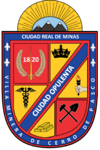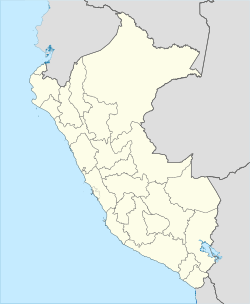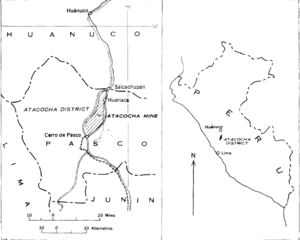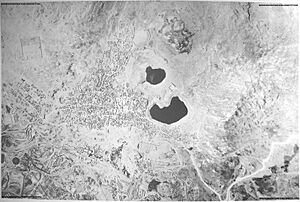Cerro de Pasco facts for kids
Quick facts for kids
Cerro de Pasco
|
||
|---|---|---|
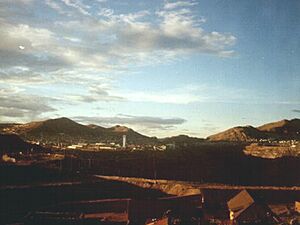
Sunset at Cerro de Pasco.
|
||
|
||
| Country | ||
| Region | Pasco | |
| Province | Pasco | |
| Founded | 20 October 1578 | |
| Elevation | 4,330 m (14,210 ft) | |
| Population
(2017)
|
||
| • Total | 58,899 | |
| • Estimate
(2015)
|
66,272 | |
| Demonym(s) | Cerreño (a) | |
Cerro de Pasco is a city located high up in the Andes Mountains in central Peru. It is the capital of both the Pasco Province and the Pasco Region. The city is a very important place for mining silver, copper, zinc, and lead.
Sitting about 4,330 meters (14,200 feet) above sea level, Cerro de Pasco is one of the highest cities in the world. With nearly 59,000 people, it is one of the highest cities with so many residents. The city has a very cold climate. It is connected to Lima, the capital of Peru, by both road and train. Lima is about 300 kilometers (186 miles) away. The city's main areas are Chaupimarca, Yanacancha, and Simón Bolívar.
Contents
A City Built on Mining
Cerro de Pasco started as a mining town in 1578 and was first called Villa de Pasco. It became famous after a lot of silver was found there in 1630. This made it one of the richest silver-producing areas in the world. Even today, mining is still a big part of the city's life.
During colonial times, the Spanish mined a lot of silver from the rocks here. Later, in 1816, Richard Trevithick from England helped install steam engines. These engines were used to pump water out of the mines, allowing miners to dig even deeper. However, mining stopped for a few years between 1820 and 1825 because of fighting during the Peruvian War of Independence.
Some of the main mines in the area are Machcan, Atacocha, and Milpo. The valuable metals are found in special rock formations. For example, the Atacocha Mine started working in 1936.
Mining can sometimes affect the environment. In Cerro de Pasco, there have been concerns about lead and other metals getting into the environment. This has led to discussions about how to keep the people and the land safe. A law was even proposed in 2006 to move the city, but this has not happened yet.
Geography and Weather
High Altitude Climate
Cerro de Pasco is very high up, at 4,330 meters (14,200 feet) above sea level. Because of this, it has an alpine tundra climate. This means the average temperature in the warmest month is too cold for trees to grow, which makes the surrounding land look quite bare. It is the largest city in the world with this type of climate.
The summers in Cerro de Pasco are often humid, damp, and cloudy, with a lot of rain. The winters are usually dry and sunny, but it stays cool or cold all year round. Sometimes, snow falls in any season, especially around dawn.
On average, the temperature in Cerro de Pasco is about 5.5°C (42°F) each year. The city also gets about 916 millimeters (36 inches) of rain per year.
| Climate data for Cerro de Pasco, elevation 4,357 m (14,295 ft), (1991–2020) | |||||||||||||
|---|---|---|---|---|---|---|---|---|---|---|---|---|---|
| Month | Jan | Feb | Mar | Apr | May | Jun | Jul | Aug | Sep | Oct | Nov | Dec | Year |
| Mean daily maximum °C (°F) | 10.6 (51.1) |
10.4 (50.7) |
10.2 (50.4) |
10.7 (51.3) |
11.3 (52.3) |
10.9 (51.6) |
10.9 (51.6) |
11.4 (52.5) |
11.1 (52.0) |
11.2 (52.2) |
11.5 (52.7) |
10.6 (51.1) |
10.9 (51.6) |
| Mean daily minimum °C (°F) | 1.6 (34.9) |
2.0 (35.6) |
1.9 (35.4) |
1.1 (34.0) |
0.0 (32.0) |
−1.3 (29.7) |
−2.3 (27.9) |
−2.0 (28.4) |
−0.6 (30.9) |
0.4 (32.7) |
0.8 (33.4) |
1.5 (34.7) |
0.3 (32.5) |
| Average precipitation mm (inches) | 112.0 (4.41) |
117.2 (4.61) |
106.2 (4.18) |
57.1 (2.25) |
27.9 (1.10) |
11.6 (0.46) |
12.4 (0.49) |
12.6 (0.50) |
36.0 (1.42) |
71.9 (2.83) |
74.0 (2.91) |
92.6 (3.65) |
731.5 (28.81) |
| Source: National Meteorology and Hydrology Service of Peru | |||||||||||||
Places to Visit
The local football stadium, Daniel Alcides Carrión Stadium, is one of the highest sports stadiums in the world. Imagine playing a game so high up!
Famous People
See also
 In Spanish: Cerro de Pasco para niños
In Spanish: Cerro de Pasco para niños
 | William M. Jackson |
 | Juan E. Gilbert |
 | Neil deGrasse Tyson |


